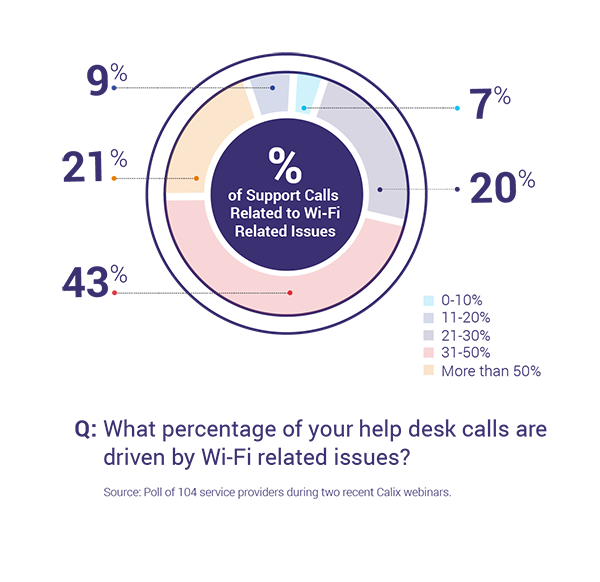When we tallied the results, here’s what we found.
- Overall, 64 percent said that Wi-Fi issues accounted for more than 30 percent of their help desk calls.
- 43 percent said that Wi-Fi issues accounted for between 31 and 40 percent of their help desk calls.
- 21 percent said that Wi-Fi issues accounted for 50 percent or more of their help desk calls.
What do these numbers mean? For a majority of the service providers polled, consumer reliance on Wi-Fi and the addition of numerous smart devices to the Connected Home means rising support costs. Considering that many of the service providers polled do not provide Wi-Fi services directly to their subscribers—nor do they charge for support—these results are problematic, if not exactly all that surprising.
One way to address the rise in Wi-Fi-related help desk calls is by offering a Managed Wi-Fi service. These services involve the service provider providing the home gateway and managing all aspects of the subscriber’s network to provide the best possible Wi-Fi experience.
All West Communications, for example, was facing challenges caused by consumer-grade Wi-Fi routers, so they launched a Managed Wi-Fi offer in March 2016. To learn more about the significant improvements that All West made to their revenue targets and support costs, watch the replay of our recent webinar “Show Me, Don’t Tell Me: Real-world benefits of focusing on customer experience”.
You can also watch a short, five-minute video featuring several employees from Consolidated Telcom in North Dakota. In the video, they explain how their Managed Wi-Fi solution has reduced their support call times and field technician deployments by half.
Looking to get your support costs under control? We can help!
Looking for ways to provide your subscribers with a better Wi-Fi experience and reduce your technical support costs?
We’re here to help. If you’d like to discuss the business case for Managed Wi-Fi services, get in touch today.




